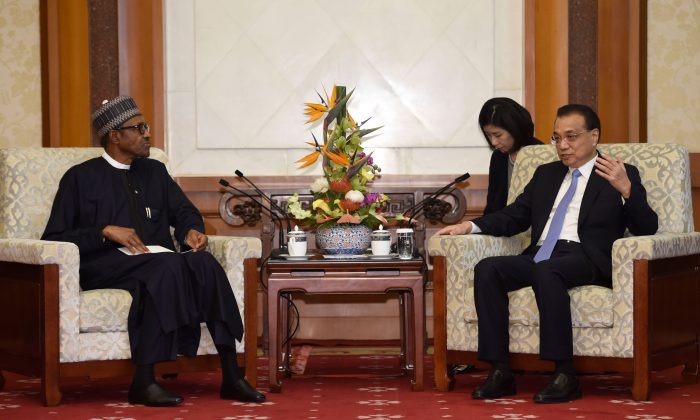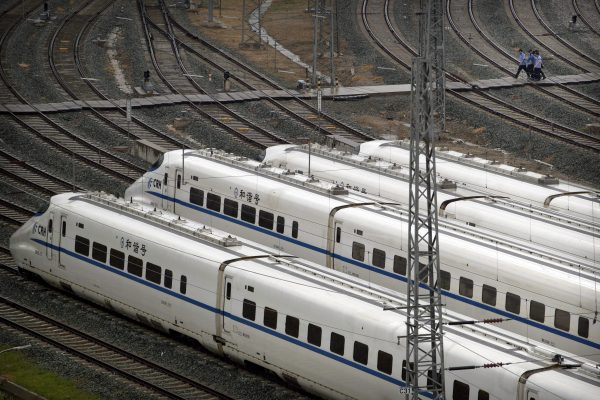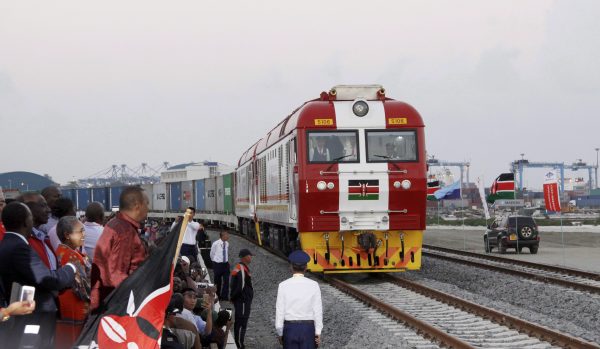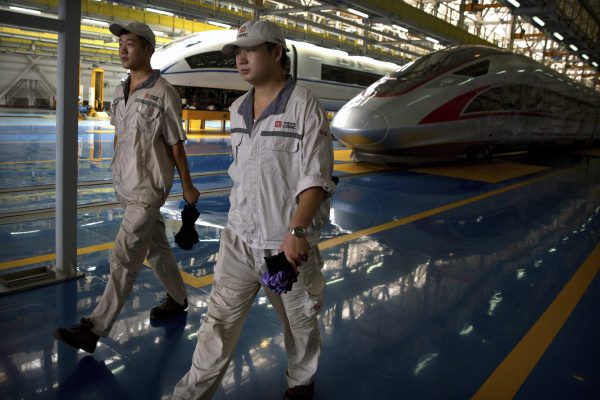
LAGOS, Nigeria when Nigerian President Muhammadu Buhari presented the country’s 2019 budget at a joint session of the country’s parliamentarians at the turn of 2018, he was interrupted by boos and jeers from lawmakers as he struggled to highlight the key achievements of his administration.
Among the criticism directed at the government and aside from issues such as poor economic growth despite relatively high crude oil prices in 2018 were the high deficit in the government’s budget as well as its heavy borrowings to cushion the effects of revenue gaps. According to the International Monetary Fund (IMF), Nigeria is servicing debts with more than 50 per cent of its total revenue, a percentage described as unreasonably high by analysts and responsible for Nigeria’s tenuous recovery from recession. In September 2018, during the Forum on China-Africa Cooperation roundtable, attended by African leaders, Chinese leader Xi Jinping announced that Beijing was offering $61 billion in funding to African countries.
Among the criticism directed at the government and aside from issues such as poor economic growth despite relatively high crude oil prices in 2018 were the high deficit in the government’s budget as well as its heavy borrowings to cushion the effects of revenue gaps. According to the International Monetary Fund (IMF), Nigeria is servicing debts with more than 50 per cent of its total revenue, a percentage described as unreasonably high by analysts and responsible for Nigeria’s tenuous recovery from recession. In September 2018, during the Forum on China-Africa Cooperation roundtable, attended by African leaders, Chinese leader Xi Jinping announced that Beijing was offering $61 billion in funding to African countries.

At the meeting, Buhari stirred a raging debate on the country’s debt profile, while noting that Nigeria’s loans from China were valued at over $5 billion in the past three years. The News Agency of Nigeria cited Nigeria’s Debt Management Office as saying that the loans (granted under China’s One Belt, One Road initiative) would be used to “finance road and rail transport, aviation, water, agriculture, and power projects,” including the upgrade of airport terminals, the Lagos–Kano rail line, the Abuja–Kaduna rail lines, and the Zungeru hydroelectric power project. Concerns about Nigeria’s debt profile have grown, as some critics think the country’s acceptance of Chinese loans hasn’t generated much in the way of economic growth.
Beijing’s less stringent loan terms haven’t eased the suspicion of economic experts, given that China has a history of luring developing countries to take loans in exchange for their natural resources and infrastructure. Sri Lanka recently forfeited control of its main southern port owing to its failure to offset a $6 billion loan from China. There are concerns that some African countries struggling to repay their loans may suffer a similar fate. Sheriffdeen Tella, a professor of economics, attributes Nigeria’s heavy borrowing to mismanagement and capital flight, adding that African countries are invariably assisting China to generate additional funds by seeking loans from the Asian country.
Given the bad experience of some African countries with Chinese loans, it’s important for an assessment of all loan agreements to counter the risk of losing the Nigerian economy to Chinese hegemony, Tella notes.The dangers for Nigeria and other African countries is that the inputs for the projects to be financed, including technical manpower, are imported from China which means the projects aren’t creating jobs for Nigerians, he said. His worry is that the funds end up going back to China, instead of creating more wealth in Nigeria.“This implies that a large proportion of each loan doesn’t get to the borrower, but resides in the country (China) producing these inputs,” he said.
Oby Ezekwesili, a former Nigerian federal minister and World Bank vice president, has expressed a similar view. She thinks the loan from China wasn’t a wise decision, describing indebtedness to China as the hardest in the world. She wrote on Twitter, “The Chinese know exactly what they are doing. If you read their loan agreements with African countries, you will see how tightly they cover their exposure. Meanwhile, our own leaders go there to naively, gleefully, and with a huge dose of inferiority complex, sign on to bad deals.“I know, because I had to deal with it in the course of my work at the World Bank, helping African countries to get the HIPC Debt Cancellation. It annoys me to no end to see our countries binging on Chinese loans.”The Situation in Kenya, Zambia
Beijing’s less stringent loan terms haven’t eased the suspicion of economic experts, given that China has a history of luring developing countries to take loans in exchange for their natural resources and infrastructure. Sri Lanka recently forfeited control of its main southern port owing to its failure to offset a $6 billion loan from China. There are concerns that some African countries struggling to repay their loans may suffer a similar fate. Sheriffdeen Tella, a professor of economics, attributes Nigeria’s heavy borrowing to mismanagement and capital flight, adding that African countries are invariably assisting China to generate additional funds by seeking loans from the Asian country.
Given the bad experience of some African countries with Chinese loans, it’s important for an assessment of all loan agreements to counter the risk of losing the Nigerian economy to Chinese hegemony, Tella notes.The dangers for Nigeria and other African countries is that the inputs for the projects to be financed, including technical manpower, are imported from China which means the projects aren’t creating jobs for Nigerians, he said. His worry is that the funds end up going back to China, instead of creating more wealth in Nigeria.“This implies that a large proportion of each loan doesn’t get to the borrower, but resides in the country (China) producing these inputs,” he said.
Oby Ezekwesili, a former Nigerian federal minister and World Bank vice president, has expressed a similar view. She thinks the loan from China wasn’t a wise decision, describing indebtedness to China as the hardest in the world. She wrote on Twitter, “The Chinese know exactly what they are doing. If you read their loan agreements with African countries, you will see how tightly they cover their exposure. Meanwhile, our own leaders go there to naively, gleefully, and with a huge dose of inferiority complex, sign on to bad deals.“I know, because I had to deal with it in the course of my work at the World Bank, helping African countries to get the HIPC Debt Cancellation. It annoys me to no end to see our countries binging on Chinese loans.”The Situation in Kenya, Zambia

Moody’s says Kenya is among countries at the highest risk of losing strategic assets to China over the pile of debt it owes Beijing.Edward Kusewa, an economist and university professor, told The Epoch Times that the development finance offered to Kenya was an option it couldn’t resist because of the country’s revenue challenges. Kusewa is concerned that Kenya is overburdened by debt, adding that the country’s recurrent expenditure had gone so high that little is left for development purposes. The economist, however, says he thinks corruption by African leaders is at the root of heavy borrowing.In Zambia, there is fear that the country might lose its international airport for defaulting on its Chinese loans. The IMF has warned that Zambia and Ethiopia were at “high risk of debt distress” to China.
But Dr Lubinda Haabazoka, president of the Economics Association of Zambia, told The Epoch Times that reports of Zambia losing its international airport to China weren’t true because, under Zambian laws, it is illegal to give public property as collateral for loans. Haabazoka says such reports arose from China’s growing economic influence in the country. He says China is despised in Zambia because the citizens think China has taken their jobs, businesses, and the economy. He said, “The problem with Chinese loans is that they don’t come in the form of Forex in most cases because everything is done from Chinese banks.
Those things (loans) come in labour, raw materials, and other tools of project implementation, so the projects are implemented by Chinese companies, but there is little that benefits Zambian companies.“So much money coming in would have even helped to stabilize the economy but it doesn’t come; cash only comes to buy those raw materials that can be sourced within Zambia. That is the major problem of a China loan. There have been debt-sustainability worries.”A Way Forward

Meanwhile, Kusewa called for an end to corruption, which he described as the primary solution to Africa’s debt crisis.“We need to get rid of the corruption within this country. The biggest problem is corruption. If we make corruption zero, we can see change. We need to reduce the cost of governance and introduce austerity measures,” he said.Credit-rating company Moody’s recently issued a warning to sub-Saharan Africa concerning the risk of losing strategic state assets to China if they fail to repay loans. Angola, Nigeria, Zambia, and some others were mentioned. Angola owes China some $21.2 billion, with a pending proposal for another $4.4 billion.
Reports say China now owns more than 70 per cent of Kenya’s bilateral debt. The East African country is yet to pay 320 billion Kenyan shillings (about $3.15 billion) borrowed to build the Standard Gauge Railway between Nairobi and Mombasa.As the continent begins a new year, experts have proffered solutions to the debt crisis. Tella reasoned that if countries such as China (which have surplus funds) don’t find borrowers, the multiplier effect of their funds on their economy will be zero or even negative.
While taking loans may be an inevitable economic measure, Tella urged African governments to be more careful and get trusted local experts involved before signing loan agreements with the Chinese or other fund providers.“This should involve project feasibility firms, with financial experts, lawyers, engineers, and technocrats whose integrity will be at stake for the misadvising government,” he said. Haabazoka stressed that African governments need to slow down on debt service.“We hope that going forward, the government will consider public-private partnerships to finance projects. The Democratic Republic of Congo has been hijacked by foreign investors that refuse to pay taxes.”